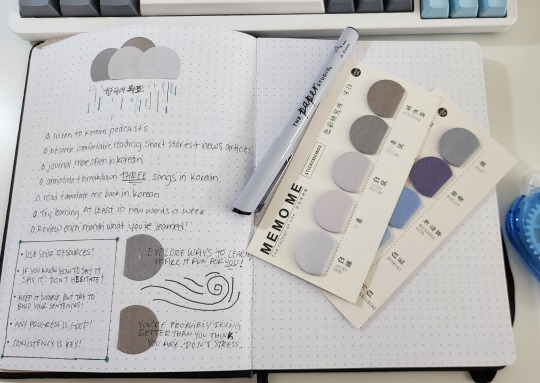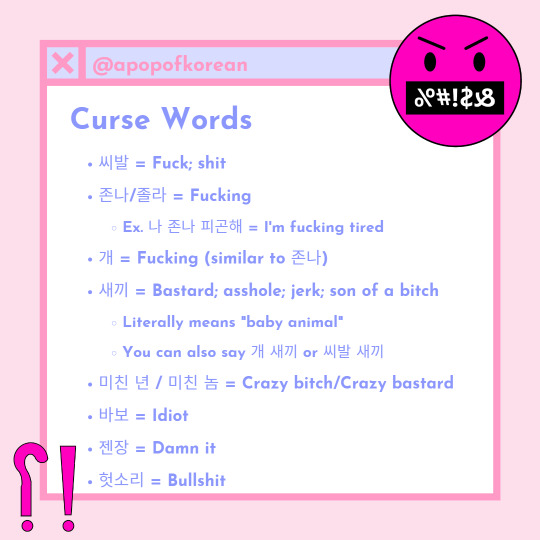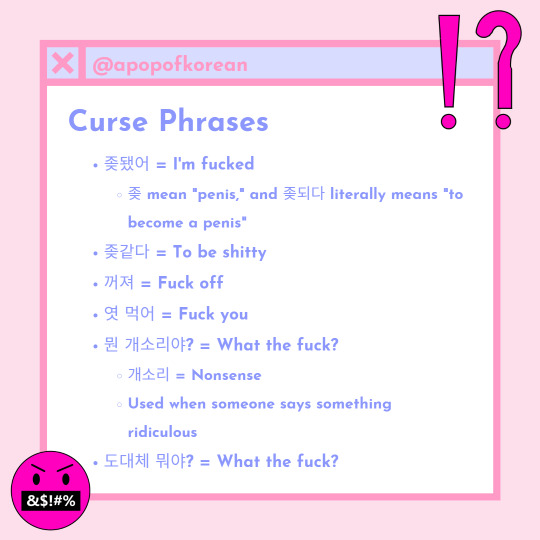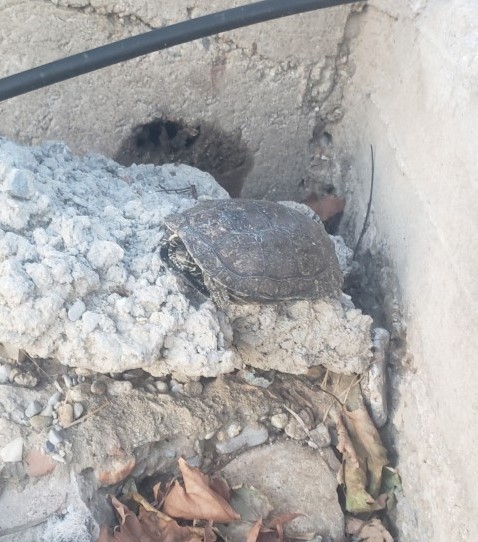Text
-는 동안 VS. -(으)면서 [+ (을) 때]
anon asked: what’s the difference between -는 동안 and -(으)면서? I’m so confused
This is a great question! I am assuming you’re asking because they can be translated as the same thing into English. I understand why there will be confusion because, under context, these grammar points aren’t really distinguishable in English as they are in Korean.
-는 동안; while, during [go here for more]
Use this when:
You’re not talking about the same doer of the action [엄마가 설거지를 하는 동안 아빠는 화장실을 청소했어요 - Mom cleaned the dishes while dad cleaned the bathroom]
You are talking about the same doer of the action [어제 공부하는 동안 문제가 생겼어요 - I found a problem while studying yesterday]
The doer of the action is inanimate [비가 많이 오는 동안 구름이 어두워졌어요 - the clouds darkened while it poured]
Try to remember that 동안 is used for a period of time; “-는 동안”은 일정 기간 동안 사용되다. Consider the example in the first rule. Think of the context of this sentence as: during the time it took for my mom to do the dishes, my dad cleaned the bathroom. Yes, you can switch it around because contextually it means the same thing, “아빠가 화장실을 청소하는 동안 엄마는 설거지를 했어요.”
NOTE: Because “-는” attaches to the dependent clause [엄마가 설거지를 하는 동안], the verb before it does not take tense and underlyingly takes the tense of the independent clause’s verb [아빠는 화장실을 청소했어요]. I used the past tense [과거] in my examples, but you can use the present tense [현재] or future tense [미래], obviously, depending on what you want to say.
More Examples:
한국에서 사는 동안 한국어를 빨리 배웠어요 - While I lived in Korea, I learned Korean quickly.
대학교 디니는 동안 어디에서 살 거예요? - Where are you going to live while attending University?
아빠가 저녁을 준비하는 동안 저는 보통 숙제를 해요 - I usually do my homework while my dad makes dinner.
희주가 세수하는 동안 혜민은 이를 닦았어요 - While Heeju washed her face, Hyemin brushed her teeth.
제가 자는 동안 고양이는 제 식물을 먹었어요 - While I slept, my cat ate my plants.
-(으)면서; while
Use this when:
The doer of the action is the same [희주는 먹으면서 유튜브를 봐요 - Heeju watches YouTube while eating]
The action is happening simultaneously [지하철을 기다리면서 친구하고 전화했어요 - I waited for the metro while I called my friend]
Contrasting two actions [대현은 한국에서 일하고 싶다고 하면서 한국어를 못해요 - Daehyun said they wanted to work in Korea, but they don’t speak Korean]
NOTE: You can only use -(으)면서 when talking about the same doer of the action or state. For example, 희주는 일하는 동안 음악을 들었어요 and 희주는 일하면서 음악을 들었어요. BOTH work and are grammatically correct. The working and listening to music is being done by 희주, whether at the same time, or during work. However, a sentence like “희주는 일하면서 혜민은 음악을 들었어요” is grammatically incorrect. Even if 희주 and 혜민 are doing this at the same time, you must use -는 동안.
More Examples:
샤워하면서 노래를 불렀어요 - While showering, I sang
요리하면서 요리법을 봐요 - While cooking, I read a recipe
수업을 들으면서 메모를 해요 - I take notes while in class
운전하면서 문자를 보내지 마세요 - Don’t text while driving
희주는 숙제를 하면서 음악을 들어요 - While Heeju does her homework, she listens to music
Differences between the two:
You can use 동안 with nouns [명사], you cannot use (으)면서 with nouns. However, you can use (이)면서 with nouns in conjunction with 이다 [저는 대학생이면서 선생님이에요 - I am a university student and a teacher]. This expresses two states of being that happen at the same time.
You can not use -는 동안 to contrast actions
You MUST use the same doer of action with (으)면서
-는 동안 expresses an action that occurs during a period of time; -(으)면서 does not necessarily take place at a specific time
Similarities between the two:
You attach tense at the end of the sentence, you cannot attach tense to the dependent verb
They are, most of the time, interchangeable; just remember the rules above
BONUS! -(을/ㄹ) 때; when
The closest origin of “때” I could find in 한자 is “時”. “때” refers to an event/time/period of action (another translation of 時 can be 시).
Things to remember:
You can use -때 with nouns and -(을/ㄹ) 때 with verbs.
Because it refers to a specific moment, you can attach tense to -(을/ㄹ) 때
You can use this with adjectives!
Can be used with -까지 and -부터! [때 + 부터 = since // 때 + 까지 = until]
Examples:
비행기를 도착할 때 엄마하고 전화할게요 - When my plane lands, I’ll call my mom
대학생[이였을] 때 돈이 없었잖아요 - When I was a uni student, I didn’t have money, as you know
한국 친구에게 한국말로 하기 시작했을 때 마이클은 깜짝 놀랐어요 - When I started speaking Korean to my Korean friend, Michael was surprised!
공부할 때 음악을 들어요 - When I study, I listen to music
시간이 있을 때 알려주세요 - Let me know when you have time
16살 때부터 한국어를 배웠어요 - I’ve been learning Korean since I was 16
이렇게 될 때까지 더 씻어야 해요 - You have to wash it more until it’s like this
한국에 갈 때 홍대하고 제주도 방문하고 싶어요 - When I go Korea, I want to visit Jeju and Hongdae
혜민 언니는 한국에 들어갔을 때 제가 너무 슬펐어요 - I was so sad when Hyemin when back to Korea
어렸을 때 그림을 그리기 시작했어요 - I started drawing when I was a kid
Hope this helps! If there’s any more confusion, please, don’t hesitate to send another message or ask!
Happy Learning :)
~ SK101
134 notes
·
View notes
Text
I just finished the first volume of "Solo Leveling" or "나 혼자만 레벨업" (which literally translates to 'I level up on my own/alone') and I think the wording is simple enough to where I can challenge myself to get the Korean editions while abroad and read them on my own!
I don't normally read manga/webtoons because I like when I can sit down for a long time and read one book, making an "event" out of it lol. But the plot of this one peaked my interest and reminded me of another xiānxiá novel series I am reading, and it was honestly better than I thought it would be!
I tend to lean towards historical-fantasy and supernatural-fantasy novels or just straight up memoirs, so this is a little different than what I am used to. If anyone has any other recommendations please let me know!
- Haneul
드림 하늘
#solo leveling#i honestly didnt know it was an anime as well until i was searching for the kren ver. online lol#korean#korean langblr#excited to try and meet my goal of reading a longer piece of work like a book or manga in korean this year#나 혼자만 레벨업#please leave book recommendations!
0 notes
Text
Here's a potentially fun one:
12K notes
·
View notes
Text
2024년 2월 4일 Journal Entry



Excuse the awful pictures, I tried to make them as aesthetic as I could ㅠㅠ
There is only a little over a week until I am in Korea and studying at my host university, and I am excited but such a nervous anxious wreck at the moment.
My friend and I have been sending instragram posts back and forth of cafes and other places we want to visit, and knowing we would never scroll back through our miles of DMs, I compiled a list of them to go along with my little practice of Korean for the week.
I've been sick these past few days, and have been left with a voice-changing sore throat and cough, so it has been a little hard to get the motivation to do anything even though the time is counting down until I have to go 💀
There is still so much to do before I leave and a lot I need to plan so I'm not gonna be surprised if disappear off the face of the planet again and forget I have this blog.
While it is only one entry, I've started working on my goal of doing small journal entries in Korean more often, and it provides a little more joy if I can decorate it and make it a little more cutesy along the way lol.
There's so much more I want to say but I don't really want this to be too long of a post so I'll leave it here :)
#studyblr#language journal#peep the mdzs novel in the corner of my photo lol#most of my time being sick has been spent catching up on my tbr books#korean#langblr#language learning
5 notes
·
View notes
Text
2024년 한국어 목표; Korean Language Goals


With my study abroad date coming closer and closer (only 19 days away ㅇ.ㅇ), I figured it was time to share some of my language/Korean specific goals for the year!
These aren't all of the things I want to "accomplish" for the year, and some are long-term while others are short-term goals, but it felt better to have something physical to look at to remind me of what I am aiming to do this year and have my thoughts organized.
The hardest thing about this is reminding myself (Hi, if you don't know me, I fear academic failure and set high expectations for myself), that it will be okay if I do these things only partially or if something didn't quite meet my expectations that it is okay.
There are some things that I want to aim for as a personal milestone that I didn't list here in an attempt to NOT overwhelm myself to get it done.
(Like trying to read Harry Potter in Korean, because 1. I am NOT at that level yet, and that will take quite the time to go through and 2. I want to buy the book second hand because JK Rowling is a bitch and I don't know yet where I could thrift the book while in Korea. Mostly want to read it because it is a book that I read over and over again as a child so the concepts/ideas/plot is familiar, just not the nuanced vocabulary and grammar)
So I am viewing this less so as a list of things to do before the year ends, and more as a set of remiders, affirmations, and sources for me to review throughout the year as I am abroad and expanding my use and knowledge of Korean.
There is so much to say about my goals and views of langauge learning, but I don't want to make this my longest post ever, so maybe some other day I will share some of my more abstract goals in another post.
Anyways, enough rambling, here's what is listed in my journal:
Listen to Korean podcasts
Become comfrotable reading short stories + news articles
Journal more often in Korean
Annotate + break down THREE songs in Korean (*not in my journal, but the goal is to understand, memorize, and practice reading speed and listening with this)
Read + annotate one book in Korean
Try learning AT LEAST 10 new words a week (*I see this one either not lasting long or turning more into 10 words every OTHER week lol)
Review each month what you've learned (*just trying to go back and refresh myself on things that I learned recently but may not have had the chance to put into practical use often)
Other notes:
Use your resoruces! I have so many Korean books and websites/apps saved, and I will use them for about a week before I forget they exist, so this is my reminder to look at them a little more often!
If you know how to say it, say it! Don't hesitate! The amount of times my friends and I have decided to speak in Korean to each other only to say something in English and then quickly realize we 100% know how to say that in AT LEAST broken Korean :/. Or when my professor would ask us to share what we did this weekend in Korean and think that my sentence or phrase is wrong, only for someone else to say something similar and realize I actually knew how to say it. Better to try and maybe be wrong and get corrected than to not try at all and learn nothing.
Keep it simple, but try to build your sentences! Actually a reminder from my Korean professor lol! If you don't know how to say it, look it up of course, but you can't pull out your phone in every conversation you have! Sometimes it is easier to keep it simple and short and others it's great to build on and connect where you can. The whole point of my last class was to work on using connectors and conjuctions for our sentences to lengthen them, but it's not always possible. Some days it is just easier to say 네 or 아 그래요 and move on if you know what I mean.
Any progress is good! There have been multiple times this year where I have literally gone to Korean tutoring and forgotten every Korean word I know and beat myself up over the fact that I feel like I "failed". Simply put, I burn out too quickly sometimes and take the minor victories for granted. Celebrate anytime you can when it comes to remembering a small vocab word or how to order food in Korean!
Consistency is Key! Seems obvious, but one summer in between semesters I didn't study Korean for at least a month and wanted to cry when I tried to self study again before the new semester because that sense of failure was kicking in and I couldn't remember a lot of what I had been practicing. Even if it is just reviewing vocab, watching a youtube video in Korean, or even a K-drama, consistency is key when it comes to learning. It doesn't have to be a lot, just something.
Explore ways to learn, make it fun for you! I have only been learning Korean for almost 2 years now, and now that I am going abroad I'm realizing that I will be in much more different situations in terms of school and socializing, so how I experience Korean is going to be different for a little while. This is just a reminder to take advantage of fun opportunities and see where and when you can learn Korean.
You're probably doing better than you think you are. Don't stress. I feel like nothing needs to be said here, but if you look at where you started versus where you are now I am sure the distance is actually farther than it seems.
#korean langblr#studyblr#study korean#langauge goals#journaling#journal entry#i don't journal often please don't judge my notebook lol#i got new pens they're great my hand tremor just says fuck you#korean#langblr#language learning
8 notes
·
View notes
Text
korean slang [part 1]
문찐 - culture loser, someone who is not interested in or does not know much about pop culture, new trends.
short for 문화찐따 = 문화(culture) + 찐따 (loser).
사진빨 - being very photogenic.
from 사진발, from 사진 (寫眞, photo) + 발 (lines, streaks).
엔조이 - enjoyment, casual romantic relationship.
네덕 - selfish, immature, and conceited fan or poster.
short for 네이버 ("Naver", main South Korean search engine and platform) + 덕후 (otaku, fan), originally because such people were most common on Naver's general blogs, rather than on more specialized platforms.
수포자 - someone who has given up on studying math (in school).
contraction of 수학 포기자.
솔크 - Christmas without a romantic partner.
of 솔로 solo + Christmas. Christmas is considered a romantic holiday in South Korea.
읽씹 - leaving a text or message on read, and not reply.
안읽씹 - intentionally leaving a text or message on unread.
ㄴㅇㅎ - being incomprehensible.
마자마자 - truetrue, yesyes.
호구 - an overly naive and submissive person; pushover.
sino-korean word from 虎口, from 虎 (“tiger”) + 口 (“mouth”). The "pushover" sense derives from the game of Go sense, implying someone who would be submissive enough to be willing to place their stone in such a position.
현자타임/현타 - (vulgar) post-nut clarity or (non-vulgar) a moment when one realizes that what one is doing is actually pointless, reality check.
현자(賢者) + 타임, calque of Japanese 賢者タイム (“post-nut clarity”).
a non-vulgar reanalysis of the above as an abbreviation of 현실(現實) 자각(自覺) 타임 (“reality perception moment”). the new interpretation retains a metaphoric extension of the original meaning, but in a non-sexual way. many Koreans are not aware of the original etymology, and the word has appeared in TV programs for general audiences.
스포당하다 - to accidentally read spoilers (of a film, video game).
눈팅 - only read articles or posts without leaving any comment; lurking.
16 notes
·
View notes
Text
231107 Vocab
처참하다: miserable, wretched
몹시 무서워 떨릴 정도로 슬프고 끔찍하다.
Sad and dreadful to such a degree that one trembles out of fear.
야비하다: mean, underhand, base
성질이나 행동이 천하고 교활하다.
One's personality or behavior being vulgar and sly.
부지불식간에: unconsciously, unwittingly, unknowingly, unawares
생각하지도 못하고 알지도 못하는 사이.
An instant when one is neither conscious nor aware of something.
소탐대실 (小貪大失): Incurring a great loss by pursuing a small profit.
작은 것을 탐하다가 큰 것을 잃음.
suffer a big loss in going after a small gain.
연막작전 (煙幕作戰): smoke operation
어떤 사실을 숨기기 위하여 교묘하고 능청스러운 말이나 수단 따위를 써서 상대편이 갈피를 못 잡게 하는 일을 비유적으로 이르는 말.
유구무언 (有口無言): no excuse to offer
변명할 말이 없음.
The state of having nothing to say as an excuse.
좌우하다: determine
어떤 일에 영향을 주어 지배하다.
To influence and dominate something.
각계각층 (各界各層): diverse fields and classes
사회의 여러 분야와 계층.
Various fields and classes in a society.
일맥상통 (一脈相通): having something in common, being in line with, being in the same vein
생각, 상태, 성질 등이 서로 통하거나 비슷해짐.
A state in which one shares a certain thought, condition, quality, etc. with another.
44 notes
·
View notes
Text
Semester in SK: Korean Curse Words
안녕하세요 여러분! I’m sharing yet another Instagram post with you all–this one is about a bunch of Korean curse words! Very silly, I know, but curse words are a big part of any language and can be fun to learn about! Of course, be careful when using these and please do not use them often–I’m just sharing them for fun and so you can recognize them if you hear them :) I hope you enjoy! 화이팅!




My masterlist
Join my Discord chat here to practice Korean with others!
Follow me on Instagram here for more Korean content!
Get Drops Premium using my affiliate link to expand your Korean vocab!
Check out my Ko-Fi to support this blog and my studies! Thank you for your generosity!
392 notes
·
View notes
Text
korean vocab: school subjects
과목 - subject
필수 과목 - required subject
선택 과목 - elective subject
시간표 - timetable
수학 - math
화학 - chemistry
역사학 - history
어학 - language studies
물리학 - physics
체육학 - physical education
생물학 - biology
심리학 - psychology
언어학 - linguistics
종교학 - religious studies
52 notes
·
View notes
Text
231008 Vocabs
감회: reminiscence
마음속에 일어나는 지난 일에 대한 생각이나 느낌.
Thoughts or feelings on the past.
소수: minority
적은 수.
A small number.
어엿하다: respectable, decent
태도가 아주 번듯하고 당당하다.
Decent and dignified in one's attitude.
태교하다: give prenatal education
아이를 가진 여자가 태아에게 좋은 영향을 주기 위해 마음을 바르게 하고 말을 조심하다.
For a pregnant woman to think of good things and watch her language, to give good influence
우여곡절 (迂餘曲折): complications; ups and downs
복잡하고 어려운 사정.
Circumstances which are complicated, not smooth.
진부하다: old-fashioned, typical
낡아서 새롭지 못하다.
Old and unoriginal.
고사하다 (固辭하다): refuse
권유나 요청을 굳이 거절하다.
To decline someone's suggestion or request.
짓궂다: provoking, perverse, nasty
장난스럽게 남을 괴롭히고 귀찮게 굴어 미운 느낌이 있다.
Someone or something being annoying because he/she or it bothers or harasses one in a wicked or playful manner.
이유식: weaning food, baby food
젖을 떼는 시기의 아이에게 먹이기 위해 부드럽게 만든 음식.
Soft food made to feed a baby in the weaning process.
올곧다: upright, square, right-minded
마음이나 정신, 행동 등이 바르고 곧다.
One's mind, behavior, etc., being right and honest.
개선: improvement
부족한 점, 잘못된 점, 나쁜 점 등을 고쳐서 더 좋아지게 함.
The act of reforming shortcomings, wrong or bad sides to character and making them better.
작심삼일 (作心三日): short-lived plan, short-lived resolution
단단히 먹은 마음이 사흘을 못 간다는 뜻으로, 결심이 강하고 단단하지 못함.
A word meaning that one cannot keep one's resolution longer than three days, namely that one's resolution is not strong and firm.
동기 부여 (動機附與): motivation
자극을 주어 생활체로 하여금 행동을 하게 만드는 일.
the act of stimulating a living body into action.
윽박지르다: bully, browbeat
심하게 마구 눌러 기를 꺾다.
To suppress severely and dampen the spirits of others.
백해무익 (百害無益): doing more harm than good/good for nothing
나쁘기만 하고 도움되는 것이 전혀 없음.
A state in which something is solely bad without doing any good.
돌파: vanquishment, conquest
어려움이나 위기를 극복함.
The act of overcoming a difficulty or crisis.
돌파: breakthrough
정해진 목표나 이전의 기록을 넘어섬.
The act of surpassing a set goal or previous record.
박진감: excitement
힘차고 빠르게 전개되어 생동감이 있는 느낌.
A feeling of being lively due to the energetic and quick development of something.
적재적소 (適材適所): right job, right work
알맞은 인재를 알맞은 자리에 씀. 또는 그런 자리.
The act of using the right person for the right position, or such a position.
70 notes
·
View notes
Text
10월 / October
Had a lovely 추석 and am enjoying this extra long holiday weekend~ Let's see what's happening this month!
1일 - 국군의날 / Armed Forces Day: This was actually celebrated on 9.26 this year (maybe because of Chuseok?) and they had a huge military parade in the middle of Seoul for the first time in years.
2일 - 임시공휴일 / Temporary Public Holiday: This Monday just happened to fall between the Chuseok holiday and National Foundation Day (both red days), so the president declared it a holiday as well this year! Supposedly it was part of a plan to "boost spending" but personally, I spend most holidays cozy at home, not out helping the economy...
3일 - 개천절 / National Foundation Day: This is a public holiday celebrating the founding of 고조선 (Gojoseon) & the Korean people. If you know the legend of 환웅 & 단군, this is the day that 환웅 came down from heaven~
8일 - 한로 / Hallo: One of the 24 seasonal divisions; the day when cold dew begins to fall
9일 - 한글날 / Hangul Day: Yes, a day to celebrate the Korean writing system! It's even a public holiday!
24일 - 상강 / Sanggang: One of the 24 seasonal divisions; this is said to be when the first frost falls
24 notes
·
View notes
Text
vocabs i learned from 알쓸별잡 ep. 7
허물다: remove, get rid of, abolish
사회적으로 이미 주어져 있는 규율이나 관습 등을 없어지게 하다.
To make a given rule or custom in a society disappear.
허물다: pull down, throw away, eliminate
심리적으로 이미 주어져 있는 생각이나 믿음 등을 없애다.
To get rid of a given thought or belief.
화석: fossil
(비유적으로) 변화하거나 발전하지 않고 어떤 상태에서 돌처럼 굳어 버린 것.
(figurative) A state of remaining firm in a certain state like a stone without showing any change or progress.
혼잡하다: chaotic, crowded, jammed
여러 가지가 한데 뒤섞여 어지럽고 복잡하다.
Many things being mixed up to make a person feel chaotic and complicated.
획일화: uniformity, standardization
모두가 하나와 같아서 다름이 없게 됨. 또는 모두가 하나와 같아서 다름이 없게 함.
For everything to become identical without any differences; or to make everything look identical without any differences.
공급하다: supply, provide
요구나 필요에 따라 물건이나 돈 등을 제공하다.
To provide things or money in response to demands or needs.
부양하다: support
수입이 없어서 혼자 생활하기 어려운 사람을 돌보다.
To take care of someone who cannot live on his/her own because he/she has no income.
기발하다: ingenious, original, novel
놀라울 정도로 재치가 있고 뛰어나다.
Witty and surprisingly brilliant.
되새기다 ruminate; meditate
지난 일을 다시 떠올려 곰곰이 생각하다.
To recall something past to one's mind and think it over.
못지않다: not inferior, as good as, almost equal
다른 것과 비교했을 때 뒤떨어지거나 못하지 않다.
Not falling behind or being inferior when compared with other things.
삭막하다: dreary, bleak
쓸쓸하고 황폐하다.
Solitary and desolate.
조율하다: compromise
(비유적으로) 여러 입장의 차이에서 생긴 문제를 해결하기 위하여 정도를 조절하다.
(figurative) To adjust the degree to resolve an issue arising from differences in position.
담보하다
어떠한 일이 잘못될 때 그 잘못을 대신하기 위해 무엇인가를 내놓다.
To present something to make up for a situation in which something has gone wrong.
처연하다: sad, sorrowful
쓸쓸하고 구슬프다.
Lonely and mournful.
거론하다: mention, bring up
어떤 것을 이야기의 주제나 문제로 삼아 논의하다.
To bring up or mention something as a subject of discussion or an object of criticism.
탁월하다: excellent, distinguished
남보다 훨씬 뛰어나다.
Far superior to others.
순전히: genuinely
순수하고 완전하게.
Purely and absolutely.
절묘하다: be marvelous, be great
비교할 데가 없을 만큼 아주 놀랍고 신기하다.
To be incomparably surprising and amazing.
불길하다: ominous, inauspicious
운이 좋지 않고 나쁜 일이 생길 것 같은 느낌이 있다.
Having a feeling that one will be unlucky and something bad will happen.
징조: omen, sign
어떤 일이 일어날 것 같은 분위기나 느낌.
A vibe or feeling that makes one think something may happen.
터무니없다: absurd, groundless
황당하고 믿음성이 없어 전혀 근거가 없다.
Something having no foundation, as it is ridiculous and lacks credibility.
타파하다: break down, destroy, overthrow
좋지 않은 관습이나 제도를 깨뜨려 버리다.
To break and dump bad customs or a bad system.
실마리: clue, lead
일이나 사건을 해결해 나갈 수 있는 시작이 되는 부분.
Something with which one starts to resolve a case or problem.
의기소침하다: depressed
자신감이 줄어들고 기운이 없어진 상태이다.
Being in the state in which one has lost one's confidence and energy.
지독하다: tenacious, persistent
의지나 마음이 매우 크고 강하다.
Having a strong will.
초고: draft
처음 쓴 글.
The preliminary version of writing.
14 notes
·
View notes
Text
I am never going to complain about Greek Duolingo again
I mean, I am. But still.
So, as some of you know, my family has been coming to this tiny Greek seaside village for several years. Just over a week ago I came out here with my mum, under the impression that early September, after the height of the summer heat, would be a good time to have a holiday. ANYWAY Storm Daniel had other ideas about that. Locally things are improving (I'm actually really pissed off about the disaster-porn tone of most English-language media coverage, but that's another post). The power is back on, there's running water most of the time, and though the latter is not drinkable, a truck from the government came and handled out free bottled water yesterday. But we are currently kind of stuck. Can't do tourist things. Can't go home. There aren't any local flights out until Saturday and the road to Thessaloniki is still closed.
So this evening, feeling kind of aimless and depressed, I go down to the nearest beach with a couple of binbags and start cleaning up in an effort to at least do something positive. I always try to do this at least once out here and obviously, after the storm, there's a lot more plastic and rubbish than usual.
At some point I find this large, round bit of metal - some kind of machinery part, I think -- that's too big for the bag, so I take it to the bins on its own, leaving the rubbish bag on the beach. And when I come back for it, something among the stones beside it moves.
Specifically, it pulls its head sharply inside its shell

So, meanwhile I've been trying to learn some Greek with the help of Duolingo.
I currently have a 33-day streak and... I have questions. Shouldn't I be able to use the past or future tenses by now? Shouldn't I be able to say "x is like y"? I can't do those things. But one thing I absolutely can say all day long is έχω μια χελώνα : I have a turtle.
This is far from the limit of Duolingo Greek's turtle-related content. "An obsession with turtles" is my mother's characterisation. I can inform you that the turtle is not a bird, and, improbably, that the turtle is drinking milk. I can introduce you to a turtle in company with a horse and an elephant. As far as Duolingo is concerned, it really is turtles all the way down.

Now this, you may be able to see, is not a turtle. It has claws rather than flippers. It is a tortoise. I know there are wild tortoises in Greece: my aunt once rescued a pair of them shagging in the middle of the road -- but that was up in the mountains. I've even seen one myself, but it was also on a road and very dead.
I am 95% certain they don't belong on beaches. There's nothing for it to eat, except, unfortunately, a lot of plastic. Even if it gets off the beach it will immediately find itself on a road where it could get hit by a car. I'm pretty sure it must have been washed down by the floodwater and has been just sitting there, dazed, ever since.
Now obviously the first thing I want to do on encountering this unusual animal is to go and tell my mummy, so I do. The tortoise immediately brightens her day. She agrees that the tortoise is not happy on the beach and needs to be taken somewhere safe. it gets surprisingly wriggly when picked up so we put it in a carrier bag with some grapes and cucumber and go looking for somewhere to rehome it.
We find a path leading up between the houses towards a likely-looking field, but before we get very far a dog in a yard goes berserk and a man's head pops over a fence and demands to know what we're doing. He does this in English, as evidently we're just that obviously tourists.
"I found a tortoise on the beach!" I explain. "We want to find somewhere to put it."
"A what," he asks.
"It's like a, you know," I begin and then to my astonishment I find myself saying... "μια χελώνα"
"Oh! A turtle!" he says.
"But from the land. δεν είναι χελώνα", [it is not a turtle,] I say, as I am worried he will tell me to put it back near the sea where I found it. As it turns out it actually IS a χελώνα, Greek does not distinguish between turtles and tortoises, but I don't know that; I can't even name the days of the week or identify any colours other than pink yet, give me a break.
The man's entire demeanour changes and thaws. He does not worry about my turtle-that-is-not-a-turtle conundrum. He knows where οι χελώνες come from and where η χελώνα μας belongs. He leads us through a gate into a courtyard area.
"[somethingsomething] μια χελώνα," he explains to the assembled onlookers, of whom there are, suddenly, a surprising number.
"ΜΙΑ ΧΕΛΩΝΑ!!!" crows the throng of delighted small children, who are, suddenly, everywhere.
"μια χελώνα!" I agree, accepting that at least for current purposes, that is what it is.
"Μπορούμε να δούμε τη χελώνα σας; [can we see your turtle?]" asks an adorable little girl, shyly, and I understand??
The children fucking love looking at the χελώνα and showing it to them is kind of magical?
I finally put the tortoise down on the grass of this wild area off to the side of the courtyard, and marvel aloud that it is weird that I barely know any Greek except how to say μια χελώνα.
"I think she will soon run off," a kind lady called Aspasia assures me, seeing I remain slightly anxious about its fate. "I don't know why I'm saying 'she'. I suppose because χελώνα is feminine in Greek."
"Yes! I know that!" I exclaim, thrilled.
"Well done!" she says. And also she asks if we are OK for drinking water after the storm and if we need any help with anything and is just generally incredibly lovely and now we know more of the neighbours!
So "μια χελώνα" has just become, by a long way, my most-used and most understood and all-around most conversationally successful phrase in Greek. So I guess I have to admit I was wrong to doubt Duolingo's wisdom: it is correct to be obsessed with turtles. And I concede that prior to learning how to count to ten or to distinguish right from left, the simple ability to yell the word TURTLE over and over again is, it turns out, a crucial element of the responsible traveller's social skills.
(I am pretty fluent in Italian and turtles haven't come up in conversation even once?)
15K notes
·
View notes
Text
Little Habits I Have Picked Up While Learning Korean
Some of these are strange and slightly unhinged, and more inside jokes between my friends and I since we are all in the same Korean program, but I just wanted to know if anyone else does the same:
Sometimes when writing I will start writing in Korean obviously, but I will randomly switch to English in the middle. Not even like the translation of the word, it will be like "언제n-" and I will write one letter in English and immediately catch myself. Idk why I do this, but it happens like every other day, and I've never used romanization before so idk where or why this started????
I will say something in English and then pause for a really long time and go "하지만-" and continue whatever I was saying in English.
When we learn loan words we often come up with our own "Korean equivalent" to them, because we think "elevator" just being "엘레베이터" is boring, so we call it "위아래방"
We are never silent. Everything needs a reaction. If someone doesn't go "아이고," "아~~~~," "그-," or make a hissing sound, they're not having a good day.
Word association of when someone is speaking in English, one of us immediately translates a word we know into Korean. "I went to the cafeteria-" "ahhh the 학교 식당"
Speaking Korean in a horrible American accent. Or any accent for that matter. Typing it out doesn't do it justice.
Integrate a single Korean word into our sentences or adding English conjugation to verbs. Some fave quotes of mine: "WE ARE AT 회사. WE DO 회사 THINGS." or "I was 춤 춰ing it up man." or the classic "We are gonna need a 쓰레기장 for all these 인간 쓰레기."
#korean langblr#these also occur nearly every day#just the other day my friend told me i have to “찌개 that bitch up”#korean#langblr#language learning
2 notes
·
View notes
Text
Korean Idioms That Are Too Relatable

말은 쉽다
Literal translation: Words are easy.
Actual usage: Easier said than done.
Rather than being taken literally as “words are easy” think of this Korean expression as having the same meaning as the English “easier said than done.”
If a task is easier to talk about than to do, then the words to speak are formed much easier than the action of accomplishing the task.
Dialogue Example:
A: 살 빼는게 뭐가 어려워.
B: 해봤어? 난 힘들던데.
A: 그냥 매일 운동만 하면 돼
B: 그래.. 말은 쉽지
A: Losing weight is not difficult at all.
B: Have you tried doing it? It is really hard for me.
A: You just have to exercise every day.
B: Yeah… It is easier said than done.
잘난 척하다
Literal translation: to pretend to have been born and brought up well
Actual usage: to brag
This Korean idiom is used to brag about anything and everything: yourself, your skills, your parents, siblings, money, etc.
Since no one likes someone who brags or shows off a lot, if someone says “잘난 척하다” to you, it’s never a good thing.
Dialogue Example:
A: 헐! 대박!
B: 왜 왜? 좋은 일 있어?
A: 한국어 시험에서 최고점을 받았어
B:와~ 진짜 대박이다
A: 뭐 이미 예상은 했지!
B: 잘난 척 하긴!
A: Wohoo! I’m amazed.
B: Why? Something good happened?
A: I got the highest mark in my Korean test.
B: Wow! That is amazing!
A: I’ve already expected it!
B: You’re bragging again!
병주고 약주다
Literal translation: to give disease and then give medicine.
Actual usage: to say something hurtful to someone and then to say something nice to cover it up.
Saying something without thinking almost always causes a problem, whether it is making something worse or hurting someone’s feelings. Often times, people try to fix the problem or cover up the damage.
This Korean idiom can also be used if a person says something hurtful, then quickly tries to come up with something to cover up his/her thoughtlessness; however, it is already too late.
Dialogue Example:
A: 파마했어?
B: 어, 어때? 좋아?
A: 난 생머리가 더 잘 어울리는 거 같아. 어, 근데, 옷도 샀어? 그건 잘 어울리네.
B: 됐어, 병주고 약주냐?
A: Did you curl your hair?
B: Yeah. How does it look like? Do you like it?
A: I think you looked prettier with straight hair. Did you buy new clothes too? It suits you well.
B: Forget it. Are you trying to comfort me after you hurt my feelings?
놀고 있다
Literal translation: to be playing, to be hanging out.
Actual usage: to be not working at the moment; what you’re doing or saying is pathetic.
놀고 있다 can be used in two different ways: neutral and negative. In a neutral context, it is used to express that someone is doing the opposite of working, such as “playing around”, “fooling around”, “not working” “not focusing on what he/she has to do” or is “jobless”.
For a negative context, it is used when you are making fun of or laughing at someone for trying too hard to accomplish something, or the way they are going about is meaningless and childish.
Dialogue Example:
A: 뭐해?
B: 내일 수학시험때문에 공부하고 있지
A: 그런데 TV는 왜 켰어?
B: 그냥 심심해서. 공부하면서 보려고.
A: 놀고 있네~ 하나만 제대로 하세요
A: What are you doing?
B: I am studying for my Math test tomorrow.
A: Why is the TV on then?
B: I was just bored. I am studying while watching TV.
A: Get out of here. Focus on one thing!
619 notes
·
View notes
Text
I wish they cut it off after like the first lesson/chapter because it is sometimes so hard to not read the romanization first because when it is written in your first language's alphabet, my eyes are naturally going to look at it and instead of practicing reading 한글 I am "easily" reading the pronunciation of the word without actually reading it. I also personally find that not every source has the romainzed words written the same, and are not written how I actually think it sounds in my head, because guess what?
English is wacky man. Korean pronunciation has specific pronunciation rules that are easy to follow and you can easily predict the pronunciation of the word based on the placement of the letter in the syllable and the consonants/vowels preceding and following it.
Hot take: i wish more korean resources DIDN’T have romanization. I fully understand how it can help in the begining tho.
#anyways-#i get it op#also disclaimer not shaming anyone who DOES use romanization#its just hard that when you decide you're ready to move on from using it or are at a higher level you can't find a lot of sources WITHOUT i#i wish online sources had a way of easily hiding it and you could reveal the romanization by just clicking on the word#korean#langblr#language learning
32 notes
·
View notes
Text
안녕하세요, 저는 김하늘이고 동아시아학 전공해요. 만나서 반가워요~
Hi, my name is Skyler, but I go by Haneul (하늘, she/her). You can call me either, my Korean name was just given to me by a close friend from SNU who was an exchange student at my school and I've used it ever since! I'm studying Korean and in my 2nd year of university and majoring in East Asian Studies with a minor in Public Relations.
My goal is to work in PR and media coming out of college, but I really dream of doing linguistic and cultural anthropology research abroad.
English is my first language, and Spanish was my introduction to my love for language learning, and I am currently learning Korean!
This blog is just for me to kind of shove all my vocab, journals, class work, etc., all in one place! I'm not really here to "teach" anyone anything, but moreso document my growth and have an outlet for practice while also sharing my experiences.
This is more of an archive or portfolio for myself but am open to talking to anyone about anything, so feel free to reach out!
드림 하늘 <3
1 note
·
View note